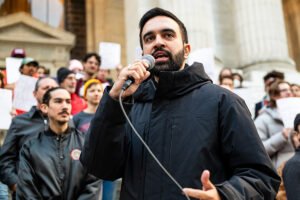
September 10, 2013; Denver Post
The power of the National Rifle Association’s 501(c)(4) political apparatus was well in evidence this week as voters in Colorado recalled two state senators, including the Colorado senate president, because of their support for stricter gun control laws. The gun advocates’ campaign theme was “ready, aim, fired.” While the NRA wasn’t the only player behind the recalls, its donation of $360,000 was significant.
There might have been more than anti-gun control motivations behind the vote. Angela Giron represented the blue-collar dominated city of Pueblo, which hadn’t had a Republican state senator in recent memory. Dustin Zvonkek, the Colorado director of conservative activist group Americas for Prosperity, applauded the recall results against “one-party rule in Denver,” and Tim Knight of the Basic Freedom Defense Fund described the vote as “a victory for the people of the state of Colorado, who have been subject to the overreach of a Democrat agenda on guns, taxes and accountability to the people.”
Sign up for our free newsletters
Subscribe to NPQ's newsletters to have our top stories delivered directly to your inbox.
By signing up, you agree to our privacy policy and terms of use, and to receive messages from NPQ and our partners.
Senate Democrats didn’t do themselves any favors when they introduced seven gun control bills in this legislative session and scheduled seven hearings on them in one day, leaving scores of people unable to testify. Given the Democrats’ control of the senate, that ploy looked heavy-handed. With the recalls of Giron and Senate President John Morse, the Democrats’ margin in the state senate has been reduced to only one.
Leaving aside the Democrats’ hearing tactic, there are still two overarching issues here of concern to nonprofits. One is the fact that despite national opinion polls showing most Americans are in favor of tougher gun controls, the nonprofit sector hasn’t particularly rallied around the issue. Late last year, Pablo Eisenberg wrote in the Chronicle of Philanthropy that “only a handful of nonprofits have made gun control a priority [and]…even fewer foundations have given money to the cause, and most of their grants have gone to research, not to mobilize the opposition.”
“Perhaps the Newtown massacre can offer a new, redemptive leadership opportunity for nonprofits. Gun violence affects every cause nonprofits focus on,” Eisenberg wrote after the Sandy Hook elementary school shooting. “It bedevils schools, health institutions, and domestic violence groups, and is a key concern of social-change organizations. What’s more, the rampages of gun violence have put nonprofit offices and religious institutions in harm’s way.”
Colorado has been an epicenter of gun violence, with massacres at a movie theater in Aurora and at Columbine High School. Despite a significant financial commitment from New York City’s billionaire mayor Michael Bloomberg, Eisenberg is suggesting that nonprofits of all stripes can and should be engaged in grassroots mobilization for gun control, in his view, a more important sector focus than its effort against potential reductions in the deductibility of charitable gifts by wealthy taxpayers.
The other issue is about democracy. At one time, recalls were largely for politicians who engaged in corrupt activities while in office. This political device, once rarely used, is now increasingly the norm. Once someone is elected, the recall planning starts. For nonprofits concerned about democracy, recalls are an issue. Typically, a recall is organized by a narrow special interest group, empowering groups like the National Rifle Association and Americans for Prosperity that can target a flood of money and efforts into isolated local or state elections. Increasingly, U.S. elections are becoming the province of special interest groups, aiming for a narrower electoral scope. Both parties do it; witness the attempted recall of Wisconsin’s Governor Scott Walker and the successful recall of California ex-governor Gray Davis.
As we noted during the Walker recall, there are many Americans who view some of these recalls as highly inappropriate. It may be time for nonprofits, a sector for which democratic values are core values, to defend the democratic process against its manipulation by well-heeled narrow interest groups.—Rick Cohen











